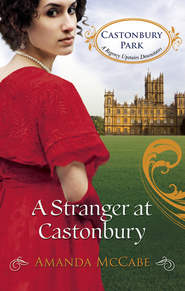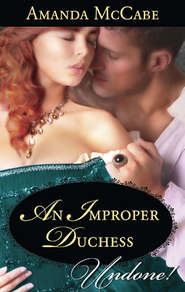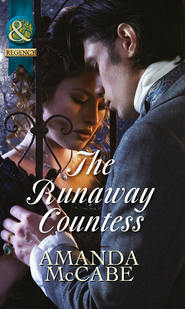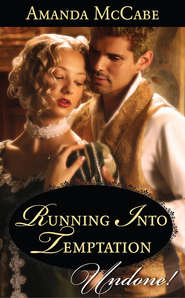По всем вопросам обращайтесь на: info@litportal.ru
(©) 2003-2024.
✖
Mischief in Regency Society: To Catch a Rogue
Настройки чтения
Размер шрифта
Высота строк
Поля
Never had a night been as dark as this one.
The moon was a mere sliver high over the crooked rooftops of London, nearly obscured by scudding clouds. There were no stars at all, not even a tiny, bead-like sparkle, and an infamous London fog was creeping inward over the sluggish Thames. Heavy and greasy, a noxious grey-green, it would soon blanket the city, cutting off even the dull shimmer of that tiny moon.
But all the guests at the Marchioness of Tenbray’s ball—and that was nearly everyone in the ton who mattered at all—cared not a whit for the ominous night outside the brilliantly lit mansion. They were far too busy moving through the crush of the ballroom, laughing, dancing, trading the latest on dits behind silken fans, drinking champagne, stealing kisses under concealment of the terrace’s potted palms. All the world seemed compressed into this one marble-and-gilt room, a swirl of music and chatter and clinking crystal rising up and up with no care for the dark chill outside.
Not one of them—not even the marchioness herself, deeply preoccupied by a sudden shortage of lobster tarts—noticed a window in the library sliding silently open.
Someone else was taking full advantage of the darkness, and not for surreptitious caresses on the terrace. No, this person had something far more important, far more devious, in mind.
As the window swung all the way open, this person, tall and slim, muffled and masked all in black, climbed inside and hopped lightly to the Aubusson carpet laid over polished parquet. The figure made no sound, as soft as cat’s paws on the silken weave. It went automatically down into a low crouch, breath held as bright eyes, revealed through the slits of the satin mask, darted from left to right. The library, as expected, was deserted, lit by only one small Colza lamp on the polished desk. It cast a circle of golden glow, flickering, sweetly scented, and all the far corners were deep in gloom. Bookshelves rose to the ceiling, crowded with leather-bound volumes that looked scarcely touched, let alone read and loved.
Well, thought the intruder. Old Lady Tenbray is scarcely renowned for her brains, is she?
Yet the late Lord Tenbray had been renowned for his passion for Italian antiquities, and this was what drew the black-clad figure’s interest. Once assured of being alone, the intruder rose from that crouch and moved stealthily across the room. The shadows were no deterrent—the library’s layout had been carefully studied, every chair and table mapped. This person knew what they sought.
At the far end of the space, on either side of the carved fireplace, were glass-topped cases, each one filled to the brim with the marquess’s ill-gotten gains. In his youth, long ago, he had served as a diplomat to the kingdom of Naples. From there, he sent home crates full of statuary, jewellery, frescoes, vases. Only a small part of the collection resided in this library.
The very best part.
“Ah, yes,” the intruder whispered. “There you are.”
From a pocket tied around the waist came a thin piece of metal, which was carefully inserted into the case’s lock. One upward twist, and the mechanism popped free.
“Lax, lax,” the person murmured, lifting up the lid. Really, people who could not take care of their possessions did not deserve them.
The object of desire lay in the very centre of the display, an Etruscan diadem of gold hammered very thin and formed into the shape of delicate leaves and vines. Once, it had graced the head of a queen. Now it satisfied an old Englishwoman’s vanity.
But not for long.
The figure reached for it with black-gloved hands. Even in the shadows the diadem glowed like the Italian sky, so light and perfect. It seemed so fragile, yet had survived so much for these thousands of years.
“You will soon be safe,” came the reassuring whisper, as the diadem disappeared into the pocket.
As its glow vanished, there was a loud thump outside the library door. The figure’s masked head whipped around, eyes wide, heart pounding.
“No, Agnes, we shouldn’t!” a man groaned, his words slurred, overly loud in the quiet room.
“Oh, but we really must!” a woman answered. “We haven’t got very long. My husband will soon leave the card room and be looking for me.”
There was another thump, then a click of the door handle as someone, either Agnes or her drunken companion, groped for the entrance.
Time to be gone. One more object emerged from that pocket, a perfect white lily that was carefully placed in the diadem’s abandoned spot. Then the figure sprinted lightly across the floor, jumping up on to the window ledge. Just as the door flew open, the thief was gone, disappearing into the gloomy night.
The Lily Thief had struck again.
Chapter One (#ulink_b70080b2-5d86-54aa-b969-f3e308efba5c)
“I call this meeting of the Ladies Artistic Society to order,” announced Calliope Chase, sounding her gavel on the table in front of her. “Our secretary, Miss Clio Chase, will take the minutes.”
Slowly, all the teacups and plates of cakes were lowered to laps and tabletops, and the members of the Society turned their attention to their founder and president. Bright sunlight flowed from the tall windows of the drawing room of the Chases’ townhouse, warm and bright after the chilly misery of the night before, casting pastel spencers and muslin gowns in a brilliant light. Everything in the fashionably appointed room was just as expected—the ladies seated in pretty groupings of chairs and settees, china tea sets, silver services, hovering housemaids, the soft sound of Mozart from the pianoforte in the corner.
All expected and proper. Except for one thing. Behind Calliope, set high on its pedestal, was a marble statue of Apollo. An anatomically correct, completely naked statue of Apollo.
But then, what else could be looked for in a house belonging to the famous scholar of Greek history, Sir Walter Chase? A house where his nine daughters, named after the Greek Muses, resided and pursued their own, not always completely ladylike, interests.
Calliope, the eldest of the Chase Muses at age twenty-one, was also not all that was expected. She was quite attractive, taking after her late mother’s French family with her black hair and brown eyes, her flawless fair skin; and those good looks—with the Chase fortune—had attracted more than a few offers from very eligible partis. Yet she had turned them all down. “They just don’t care about history and antiquities,” she told her father, and he immediately agreed that those young men would never do for one of the Chase Muses.
She also cared little for fashion or for dancing or cards, preferring to spend her time in study, or in conversation about her studies with like-minded people.
That was why she founded the Ladies Artistic Society in the first place, so that she and her sisters could reach out to other females with more on their minds than hemlines and hats. “Surely there must be others like us here in London,” she told her sister Clio. “You know—ladies who wish they could take books with them to pass the dull hours at Almack’s.”
And so there were. Their membership now included two of their friends, along with the three eldest Chase daughters (the other six still being in the schoolroom, and therefore members-in-waiting). There was also a waiting list, though Calliope suspected that many of those just wanted a glimpse of Apollo. They met once a week during the Season to talk about history, literature, art, music. Often a guest lecturer, provided by the Muses’ father, would speak, or a painter would give a demonstration. Sometimes they would just discuss amongst themselves a book read or an opera seen, or Thalia, the third Chase sister and an ardent musician, would perform a scandalous, passionate Beethoven piece.
Not today, though. Today there was very serious business to discuss, and obviously everyone discerned that from the stiff set of Calliope’s shoulders in her white muslin day dress. A hush fell over the bright room, all clinkings and rustlings stilled. Even Thalia ceased playing the pianoforte, swivelling around to face her sister.
Calliope lifted up a copy of the Post, pointing at a black, shrieking headline: The Lily Thief Returns!
“It has been many weeks since this criminal struck,” Calliope said softly. Her voice was quiet, but she felt her cheeks burn with the force of her inner anger. Many weeks—and she had thought the Lily Thief gone, vanished like so many other ephemeral sensations in Society. A two-day scandal, and then something else, an elopement or divorce, or other such harmless trifle. “I suppose he realised that attention was drifting from his foul deeds.”
Her sister Clio glanced up from the minutes, her auburn brow arched above the gilt frames of her spectacles. Clio said nothing, though. Merely went back to her note-taking. It was Lady Emmeline Saunders who spoke. “Perhaps the Lily Thief has very good reasons for what he does.”
“Reasons such as profit and riches?” Thalia cried from her piano. Her golden curls, so shiny and pretty, trembled with indignation. Thalia might look like a china shepherdess, but she had the heart of a gladiator. And that accounted for the many scrapes she always found herself in. “I am sure he saw a pretty penny from the sale of Lord Egermont’s Euphronios krater and the Clives’ Bastet statue.”
“Antiquities have more than a monetary value, you know,” Clio said quietly. “Something their previous owners seemed to have lost sight of.”
“Of course they do,” Calliope said. “And that is what makes the exploits of this Lily Thief so heinous. Who knows where these objects have gone, or if they will ever be seen again? We will have no access to the lessons they could teach us. It is a terrible loss to scholarship.”
Clio bent her head back over her notes, murmuring low enough for only Calliope to hear, “As if there was much scholarship going on in Lady Tenbray’s library.”
“The Lily Thief does not just steal money or jewels, as a common burglar would. Objects that could easily be replaced,” Calliope said. “He steals history.”
The other Society members glanced at each other. Finally, Emmeline raised her hand again. “What must we do about this, Calliope? Perhaps engage a don from Cambridge to speak on cultural thefts?”
“Or tomb-raiding!” cried Miss Charlotte Price, the youngest and most excitable of the Society. She had an unfortunate predilection for reading horrid novels, but her father was a friend of Sir Walter Chase. He hoped the Society would help her expand her horizons. So far the hope was in vain, but one never knew. “I did read about a cursed tomb robber in The Baron’s Revenge—”
“Yes, indeed,” Calliope said, interrupting smoothly before Lotty could be carried off into a rambling synopsis. “But I have something rather more—personal in mind.”
“Personal?” the others chorused.
“Yes.” Calliope placed her palms flat on the table before her, leaning towards her audience. “We are going to catch the Lily Thief ourselves.”
A great sigh went up, floating to the plaster-ceiling medallion in a wave of exclamation.
“Oh, how very thrilling!” trilled Charlotte. “Just like The Curse of Lady Arabella—”
“We are to turn amateur sleuths?” Thalia said, clapping her hands. “What a marvellous idea!”
“Indeed,” agreed Emmeline. “Scholastic inquiry is all very well, but sometimes we need to move.”











